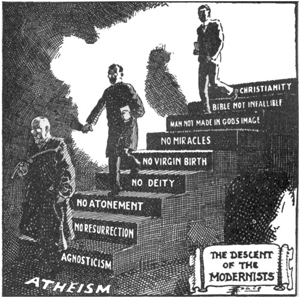I am committed to historic fundamentalism. It is an ideology and I hold to its tenets, just in case some of you were wondering.
Now, I am NOT what many of you are, but I am certain I am not alone. This is why I am starting this thread. "What sets fundamentalism apart from other ideas?" "What are the bare essentials of fundamentalism?"
--Some believe it is an ideology that means you stand on the KJV as the exclusive word of God.
--Some believe it is an ideology that is a subset of being Baptist.
--Some say it is an ideology that means you separate.
If you study the various confessions, you will probably be surprised.
--Fundamentalism belongs to no particular denomination. It has included Presbyterians, Methodists, Baptists and Episcopalians.
--Fundamentalism rejected the idea that the KJV is the exclusive word of God.
--Fundamentalism separates, but it separated on entirely different basis than the modern fundamentalist (i.e., not able to have Bruce Ware speak at your college).
Fundamentalism is really a commitment to the word of God against Modernism.
--The Niagara Bible Conference, 1878, had a 14 point confession.
--The Presbyterians, in 1910, had a 5 point confession.
There are multiple confessions that lay out the doctrinal positions of various fundamentalists. So, my approach to understanding "fundamentalism" is to compare the above confessions and find the common denominators.
The Niagara Bible Conference confession is more strict and includes the idea of having to be a premillinealist. Though I am, I do not view that as a defining tenet because other fundamentalists are not premillineal.
Here is a good graphic which illustrates the key points that are important to any fundamentalist.

Now, I am NOT what many of you are, but I am certain I am not alone. This is why I am starting this thread. "What sets fundamentalism apart from other ideas?" "What are the bare essentials of fundamentalism?"
--Some believe it is an ideology that means you stand on the KJV as the exclusive word of God.
--Some believe it is an ideology that is a subset of being Baptist.
--Some say it is an ideology that means you separate.
If you study the various confessions, you will probably be surprised.
--Fundamentalism belongs to no particular denomination. It has included Presbyterians, Methodists, Baptists and Episcopalians.
--Fundamentalism rejected the idea that the KJV is the exclusive word of God.
--Fundamentalism separates, but it separated on entirely different basis than the modern fundamentalist (i.e., not able to have Bruce Ware speak at your college).
Fundamentalism is really a commitment to the word of God against Modernism.
--The Niagara Bible Conference, 1878, had a 14 point confession.
--The Presbyterians, in 1910, had a 5 point confession.
There are multiple confessions that lay out the doctrinal positions of various fundamentalists. So, my approach to understanding "fundamentalism" is to compare the above confessions and find the common denominators.
The Niagara Bible Conference confession is more strict and includes the idea of having to be a premillinealist. Though I am, I do not view that as a defining tenet because other fundamentalists are not premillineal.
Here is a good graphic which illustrates the key points that are important to any fundamentalist.

